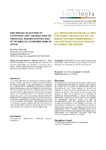Mostrar o rexistro simple do ítem
¿La financiarización de la vida cotidiana? Un análisis de las subjetividades financieras y las actitudes hacia el riesgo económico en España
| dc.contributor.author | Abalde, Nazaret | |
| dc.date.accessioned | 2021-03-17T09:20:12Z | |
| dc.date.available | 2021-03-17T09:20:12Z | |
| dc.date.issued | 2020 | |
| dc.identifier.citation | Abalde, N. 2020. “The financialisation of everyday life? An analysis of financial subjectivities and attitudes to economic risk in Spain”. Revista Internacional de Sociología 78(4):e172. https://doi.org/10.3989/ris.2020.78.4.m20.004 | es_ES |
| dc.identifier.issn | 0034-9712 | |
| dc.identifier.uri | http://hdl.handle.net/2183/27548 | |
| dc.description.abstract | [Resumen] El presente artículo aborda el estudio de la constitución de las subjetividades financieras en España. Dicho objetivo se enmarca en el conjunto de contribuciones sobre la financiarización de la vida cotidiana, un proceso que redefine los ciclos de vida de las personas como nuevos espacios de cálculo y de inversión. El artículo analiza este proceso a través de la técnica de la entrevista en profundidad semiestructurada. El análisis del discurso, desarrollado a partir de un modelo analítico del concepto de subjetividad financiera, revela una falta de correspondencia entre las aportaciones teóricas del concepto en la literatura y los hallazgos empíricos. Los entrevistados manifiestan un comportamiento económico débilmente financiarizado. La percepción generalizada de desconfianza hacia el sistema financiero, junto con el predominio de las estructuras públicas de bienestar social, desincentivan las inversiones financieras como mecanismo de protección frente a los riesgos. | es_ES |
| dc.description.abstract | [Abstract] This article addresses the constitution of financial subjectivities in Spain. It is part of a series of studies aimed at furthering knowledge of the financialisation of everyday life, a process that is redefining the lifecycles of individuals and forging new spaces for calculation and investment. Our work analyses this process, using the technique of the semi-structured in-depth interview. The discourse analysis, based on an analytical model of the concept of financial subjectivity, points to a lack of correspondence between the theoretical contributions concerning this concept and empirical findings. Respondents’ economic behaviour was found to be only weakly financialised. A generalised lack of trust in the financial system, together with the predominance of public social welfare structures, discourage the use of financial investment as a means of protection against risk. | es_ES |
| dc.description.sponsorship | Este artigo recibiu financiación do proxecto “Social consequences of financialisation: monetary accumulation, lack of employment, social inequality” patrocinado polo Ministerio de Economia y Competitividad - Gobierno de España, número de referencia do proxecto: CSO2016-78122-R. | es_ES |
| dc.language.iso | eng | es_ES |
| dc.publisher | CSIC, Instituto de Estudios Sociales Avanzados | es_ES |
| dc.relation.uri | https://doi.org/10.3989/ris.2020.78.4.m20.004 | es_ES |
| dc.rights | Licencia Creative Commons Atribución 4.0 International (CC BY 4.0) | es_ES |
| dc.rights.uri | http://creativecommons.org/licenses/by/3.0/es/ | * |
| dc.subject | Financiarización | es_ES |
| dc.subject | Neoliberalismo | es_ES |
| dc.subject | Investigación cualitativa | es_ES |
| dc.subject | Subjetividad | es_ES |
| dc.subject | Financialisation | es_ES |
| dc.subject | Neoliberalism | es_ES |
| dc.subject | Qualitative research | es_ES |
| dc.subject | Subjectivity | es_ES |
| dc.title | ¿La financiarización de la vida cotidiana? Un análisis de las subjetividades financieras y las actitudes hacia el riesgo económico en España | es_ES |
| dc.title.alternative | The financialisation of everyday life? An analysis of financial subjectivities and attitudes to economic risk in Spain | es_ES |
| dc.type | journal article | es_ES |
| dc.rights.accessRights | open access | es_ES |
| UDC.journalTitle | Revista Internacional de Sociología | es_ES |
| UDC.volume | 78 | es_ES |
| UDC.issue | 4 | es_ES |
| UDC.startPage | e172 | es_ES |
| UDC.coleccion | Investigación | es_ES |
| UDC.departamento | Socioloxía e Ciencias da Comunicación | es_ES |
Ficheiros no ítem
Este ítem aparece na(s) seguinte(s) colección(s)
-
Investigación (FSOC) [405]






